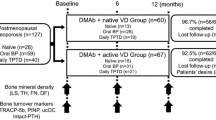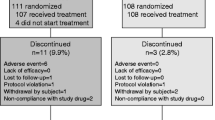Abstract
The aim of this observational, nonrandomized study was to compare the effects of 12 months of monthly minodronate (MIN; 50 mg/month) monotherapy and MIN combination therapy with vitamin K2 (VK; 45 mg/day) or eldecalcitol (ELD; 0.75 μg/day) in treatment-naïve patients with primary osteoporosis. Patients (n = 193; 178 postmenopausal women and 15 men; mean age 71.6 years) were treated with (1) MIN monotherapy (n = 63), (2) MIN plus VK combination therapy (n = 50), or (3) MIN plus ELD combination therapy (n = 80) for 12 months. Changes in bone mineral density (BMD) and the levels of serum bone turnover markers were monitored. No significant difference was observed in baseline BMD among the three groups. After 12 months, BMD increased by 2.93, 4.65, and 6.55 % in the lumbar spine, 0.66, 2.57, and 3.42 % in the total hip, and 0.05, 2.06, and 3.58 % in the femoral neck in groups 1, 2, and 3, respectively. The BMD increase induced by MIN plus ELD combination therapy was significantly greater than that induced by MIN monotherapy in the lumbar spine (P = 0.0002), total hip (P = 0.003), and femoral neck (P = 0.004), and also that induced by MIN plus VK combination therapy in the lumbar spine (P = 0.03). MIN plus ELD combination therapy compared with MIN monotherapy resulted in a greater decrease in serum procollagen type I N-terminal propeptide levels (−37.4 % vs −54.6 %; P = 0.001) and tartrate-resistant acid phosphatase isoform 5b levels (−41.1 % vs −52.9 %; P = 0.009) at 3 months, and a greater decrease in procollagen type I N-terminal propeptide levels (−64.3 % vs −50.3 %; P = 0.03) and a decrease in intact parathyroid hormone levels (−12.3 % vs 14.0 %; P = 0.01) at 12 months. Combination therapy with MIN and VK or ELD for 12 months showed additive effects in decreasing the levels of bone turnover markers compared with MIN monotherapy, whereas MIN plus ELD combination therapy resulted in the highest BMD increase compared with MIN monotherapy and MIN plus VK combination therapy.



Similar content being viewed by others
References
Dunford JE, Thompson K, Coxon FP, Luckman SP, Hahn FM, Poulter CD, Ebetino FH, Rogers MJ (2001) Structure–activity relationships for inhibition of farnesyl diphosphate synthase in vitro and inhibition of bone resorption in vivo by nitrogen-containing bisphosphonates. J Pharmacol Exp Ther 296:235–242
Cockayne S, Adamson J, Lanham-New S, Shearer MJ, Gilbody S, Torgerson DJ (2006) Vitamin K and the prevention of fractures: systematic review and meta-analysis of randomized controlled trials. Arch Intern Med 166:1256–1261
Cumming RG, Klineberg RJ (1994) Case–control study of risk factors for hip fractures in the elderly. Am J Epidemiol 139:493–503
Sakuma M, Endo N, Oinuma T, Hayami T, Endo E, Yazawa T, Watanabe K, Watanabe S (2006) Vitamin D and intact PTH status in patients with hip fracture. Osteoporos Int 17:1608–1614
Szulc P, Arlot M, Chapuy MC, Duboeuf F, Meunier PJ, Delmas PD (1994) Serum undercarboxylated osteocalcin correlates with hip bone mineral density in elderly women. J Bone Miner Res 9:1591–1595
Szulc P, Chapuy MC, Meunier PJ, Delmas PD (1993) Serum undercarboxylated osteocalcin is a marker of the risk of hip fracture in elderly women. J Clin Invest 91:1769–1774
Tang BM, Eslick GD, Nowson C, Smith C, Bensoussan A (2007) Use of calcium or calcium in combination with vitamin D supplementation to prevent fractures and bone loss in people aged 50 years and older: a meta-analysis. Lancet 370:657–666
Hirao M, Hashimoto J, Ando W, Ono T, Yoshikawa H (2008) Response of serum carboxylated and undercarboxylated osteocalcin to alendronate monotherapy and combined therapy with vitamin K2 in postmenopausal women. J Bone Miner Metab 26:260–264
Kasukawa Y, Miyakoshi N, Ebina T, Aizawa T, Hongo M, Nozaka K, Ishikawa Y, Saito H, Chida S, Shimada Y (2014) Effects of risedronate alone or combined with vitamin K2 on serum undercarboxylated osteocalcin and osteocalcin levels in postmenopausal osteoporosis. J Bone Miner Metab 32:290–297
Suzuki K, Tsuji S, Fukushima Y, Nakase T, Hamada M, Tomita T, Yoshikawa H (2013) Clinical results of alendronate monotherapy and combined therapy with menatetrenone (VitK2) in postmenopausal RA patients. Mod Rheumatol 23:450–455
Heckman GA, Papaioannou A, Sebaldt RJ, Ioannidis G, Petrie A, Goldsmith C, Adachi JD (2002) Effect of vitamin D on bone mineral density of elderly patients with osteoporosis responding poorly to bisphosphonates. BMC Musculoskelet Disord 3:6
Ringe JD, Fardellone P, Kruse HP, Amling M, van der Geest SA, Moller G (2009) Value of a new fixed-combination pack of bisphosphonate, calcium and vitamin D in the therapy of osteoporosis: results of two quantitative patient research studies. Drugs Aging 26:241–253
Koitaya N, Sekiguchi M, Tousen Y, Nishide Y, Morita A, Yamauchi J, Gando Y, Miyachi M, Aoki M, Komatsu M, Watanabe F, Morishita K, Ishimi Y (2014) Low-dose vitamin K2 (MK-4) supplementation for 12 months improves bone metabolism and prevents forearm bone loss in postmenopausal Japanese women. J Bone Miner Metab 32:142–150
Miki T, Nakatsuka K, Naka H, Kitatani K, Saito S, Masaki H, Tomiyoshi Y, Morii H, Nishizawa Y (2003) Vitamin K2 (menaquinone 4) reduces serum undercarboxylated osteocalcin level as early as 2 weeks in elderly women with established osteoporosis. J Bone Miner Metab 21:161–165
Yamaguchi M, Weitzmann MN (2011) Vitamin K2 stimulates osteoblastogenesis and suppresses osteoclastogenesis by suppressing NF-κB activation. Int J Mol Med 27:3–14
Holick MF, Siris ES, Binkley N, Beard MK, Khan A, Katzer JT, Petruschke RA, Chen E, de Papp AE (2005) Prevalence of vitamin D inadequacy among postmenopausal North American women receiving osteoporosis therapy. J Clin Endocrinol Metab 90:3215–3224
Lips P, Hosking D, Lippuner K, Norquist JM, Wehren L, Maalouf G, Ragi-Eis S, Chandler J (2006) The prevalence of vitamin D inadequacy amongst women with osteoporosis: an international epidemiological investigation. J Intern Med 260:245–254
Carmel AS, Shieh A, Bang H, Bockman RS (2012) The 25(OH)D level needed to maintain a favorable bisphosphonate response is ≥33 ng/ml. Osteoporos Int 23:2479–2487
Ishijima M, Sakamoto Y, Yamanaka M, Tokita A, Kitahara K, Kaneko H, Kurosawa H (2009) Minimum required vitamin D level for optimal increase in bone mineral density with alendronate treatment in osteoporotic women. Calcif Tissue Int 85:398–404
Islam MZ, Viljakainen HT, Karkkainen MU, Saarnio E, Laitinen K, Lamberg-Allardt C (2012) Prevalence of vitamin D deficiency and secondary hyperparathyroidism during winter in pre-menopausal Bangladeshi and Somali immigrant and ethnic Finnish women: associations with forearm bone mineral density. Br J Nutr 107:277–283
Kroll MH, Bi C, Garber CC, Kaufman HW, Liu D, Caston-Balderrama A, Zhang K, Clarke N, Xie M, Reitz RE, Suffin SC, Holick MF (2015) Temporal relationship between vitamin D status and parathyroid hormone in the United States. PLoS One 10:e0118108
Noguchi Y, Kawate H, Nomura M, Takayanagi R (2013) Eldecalcitol for the treatment of osteoporosis. Clin Interv Aging 8:1313–1321
Harada S, Mizoguchi T, Kobayashi Y, Nakamichi Y, Takeda S, Sakai S, Takahashi F, Saito H, Yasuda H, Udagawa N, Suda T, Takahashi N (2012) Daily administration of eldecalcitol (ED-71), an active vitamin D analog, increases bone mineral density by suppressing RANKL expression in mouse trabecular bone. J Bone Miner Res 27:461–473
de Freitas PH, Hasegawa T, Takeda S, Sasaki M, Tabata C, Oda K, Li M, Saito H, Amizuka N (2011) Eldecalcitol, a second-generation vitamin D analog, drives bone minimodeling and reduces osteoclastic number in trabecular bone of ovariectomized rats. Bone 49:335–342
Sugimoto M, Futaki N, Harada M, Kaku S (2013) Effects of combined treatment with eldecalcitol and alendronate on bone mass, mechanical properties, and bone histomorphometry in ovariectomized rats: a comparison with alfacalcidol and alendronate. Bone 52:181–188
Soen S, Fukunaga M, Sugimoto T, Sone T, Fujiwara S, Endo N, Gorai I, Shiraki M, Hagino H, Hosoi T, Ohta H, Yoneda T, Tomomitsu T, Japanese Society for Bone and Mineral Research and Japan Osteoporosis Society Joint Review Committee for the Revision of the Diagnostic Criteria for Primary Osteoporosis (2013) Diagnostic criteria for primary osteoporosis: year 2012 revision. J Bone Miner Metab 31:247–257
Shiraki M, Yamazaki Y, Shiraki Y, Hosoi T, Tsugawa N, Okano T (2010) High level of serum undercarboxylated osteocalcin in patients with incident fractures during bisphosphonate treatment. J Bone Miner Metab 28:578–584
Kanis JA, Johnell O, De Laet C, Johansson H, Oden A, Delmas P, Eisman J, Fujiwara S, Garnero P, Kroger H, McCloskey EV, Mellstrom D, Melton LJ, Pols H, Reeve J, Silman A, Tenenhouse A (2004) A meta-analysis of previous fracture and subsequent fracture risk. Bone 35:375–382
Klotzbuecher CM, Ross PD, Landsman PB, Abbott TA 3rd, Berger M (2000) Patients with prior fractures have an increased risk of future fractures: a summary of the literature and statistical synthesis. J Bone Miner Res 15:721–739
Ebina K, Hashimoto J, Shi K, Kashii M, Hirao M, Yoshikawa H (2014) Comparison of the effect of 18-month daily teriparatide administration on patients with rheumatoid arthritis and postmenopausal osteoporosis patients. Osteoporos Int 25:2755–2765
Hochberg MC, Greenspan S, Wasnich RD, Miller P, Thompson DE, Ross PD (2002) Changes in bone density and turnover explain the reductions in incidence of nonvertebral fractures that occur during treatment with antiresorptive agents. J Clin Endocrinol Metab 87:1586–1592
Bauer DC, Black DM, Garnero P, Hochberg M, Ott S, Orloff J, Thompson DE, Ewing SK, Delmas PD (2004) Change in bone turnover and hip, non-spine, and vertebral fracture in alendronate-treated women: the Fracture Intervention Trial. J Bone Miner Res 19:1250–1258
Eastell R, Barton I, Hannon RA, Chines A, Garnero P, Delmas PD (2003) Relationship of early changes in bone resorption to the reduction in fracture risk with risedronate. J Bone Miner Res 18:1051–1056
Sakai A, Ito M, Tomomitsu T, Tsurukami H, Ikeda S, Fukuda F, Mizunuma H, Inoue T, Saito H, Nakamura T (2015) Efficacy of combined treatment with alendronate (ALN) and eldecalcitol, a new active vitamin D analog, compared to that of concomitant ALN, vitamin D plus calcium treatment in Japanese patients with primary osteoporosis. Osteoporos Int 26:1193–1202
Uchiyama Y, Higuchi Y, Takeda S, Masaki T, Shira-Ishi A, Sato K, Kubodera N, Ikeda K, Ogata E (2002) ED-71, a vitamin D analog, is a more potent inhibitor of bone resorption than alfacalcidol in an estrogen-deficient rat model of osteoporosis. Bone 30:582–588
Shiraki M, Kushida K, Fukunaga M, Kishimoto H, Kaneda K, Minaguchi H, Inoue T, Tomita A, Nagata Y, Nakashima M, Orimo H (1998) A placebo-controlled, single-blind study to determine the appropriate alendronate dosage in postmenopausal Japanese patients with osteoporosis. Endocr J 45:191–201
Barone A, Giusti A, Pioli G, Girasole G, Razzano M, Pizzonia M, Palummeri E, Bianchi G (2007) Secondary hyperparathyroidism due to hypovitaminosis D affects bone mineral density response to alendronate in elderly women with osteoporosis: a randomized controlled trial. J Am Geriatr Soc 55:752–757
Acknowledgments
The authors thank Masao Yukioka and Norihiro Matsuoka for their excellent cooperation in conducting the study.
Author information
Authors and Affiliations
Corresponding author
Ethics declarations
Conflict of interest
The authors declare that they have no conflict of interest.
About this article
Cite this article
Ebina, K., Noguchi, T., Hirao, M. et al. Comparison of the effects of 12 months of monthly minodronate monotherapy and monthly minodronate combination therapy with vitamin K2 or eldecalcitol in patients with primary osteoporosis. J Bone Miner Metab 34, 243–250 (2016). https://doi.org/10.1007/s00774-015-0710-2
Received:
Accepted:
Published:
Issue Date:
DOI: https://doi.org/10.1007/s00774-015-0710-2




